
809.3K
Downloads
213
Episodes
Drawing on years of experience working with families, Parenting Coaches Siope Kinikini and Kimber Petersen share how families can improve, heal, and find success using the proven methods of the Teaching-Family Model. Visit smarterparenting.com to learn more.
Episodes
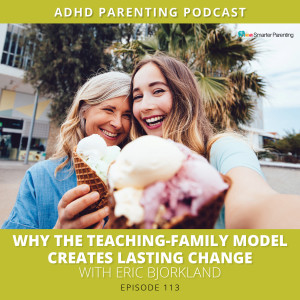
Wednesday Dec 09, 2020
Ep #113: Why the Teaching-Family Model creates lasting change
Wednesday Dec 09, 2020
Wednesday Dec 09, 2020
Understanding how the Teaching-Family came about and how it's been used to change children and families helps parents better understand the Teaching-Family Model's power in their lives.
In this episode, Eric Bjorklund, President of Utah Youth Village, talks about how the Teaching-Family Model came to be, the research that's gone into proving its effectiveness, and how it's used worldwide. He shares stories of how he's used the Teaching-Family Model as a dad and the difference it made in his relationships with his kids, and the success that Utah Youth Village has witnessed.
Smarter Parenting is a division of Utah Youth Village and was created to help families worldwide access the power of the Teaching-Family Model.
The Teaching-Family Model was developed in the 1960s to deal with children who had challenging behavior. The researchers found that they could teach children how to be successful long-term by teaching them specific behavioral skills that allow them to learn, grow, and change. By focusing on the good a child is doing, you will start to see incredible results.
Since the 1960s, the Teaching-Family Model been used by agencies, schools, and parents worldwide to address all types of behavior.
The Teaching-Family is not only for kids with problematic behaviors; any child and family can benefit from using the behavior skills you will find on SmarterParenting.com.
The success of the Teaching-Family is due to its focus on relationships and helping the child do better by teaching them what they should do and allowing them to change.
For a short video of the history of the Teaching-Family Model, watch this video.
For more information on the Teaching-Family Model, we hope you'll check out the resources available on SmarterParenting.com.
For help implementing the Teaching-Family Model in your family, sign up for parenting coaching.
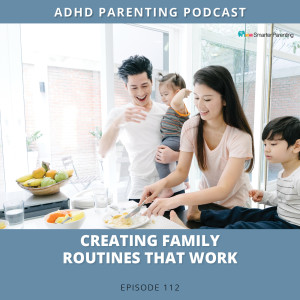
Wednesday Dec 02, 2020
Ep #112: Creating family routines that work
Wednesday Dec 02, 2020
Wednesday Dec 02, 2020
Creating family routines that work are tricky enough during the best of times. With the constant changes to work and school schedules brought about because of the pandemic, it can be hard to feel like you're finding a routine that works for your family.
When determining a schedule, take into consideration the needs of your family and their personalities. Does your family do better on more or less structure? Do your kids do better when given some freedom? Are they more of a morning or an evening person?
Understanding your family's needs will help you create a schedule that works for how your family functions. If your family likes a lot of structure, a routine with very little structure won't be effective.
Because of the different needs of your family, you may need multiple schedules. That's okay. The purpose of a family routine is to help each family member in a way that works for them.
Don't feel guilty if your family routine doesn't look like popular routines. It's okay to have more or less structure than someone else or do things differently. Remember, no routine will be useful if it doesn't make sense for your family.
Helping your child understand the routine and what is expected of them is crucial in making that routine work. The behavior skill of Preventive Teaching helps you do just that. When a child understands what is expected of them and how they need to respond to certain things, they are more likely to do it independently.
You can find the behavior skill of Preventive Teaching on the Smarter Parenting website.
Don't forget to join the Smarter Parenting Club. You will have access to incredible parenting resources that will help make your life easier.
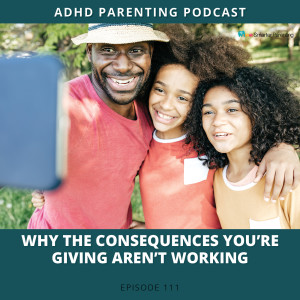
Wednesday Nov 25, 2020
Ep #111:Why consequences aren't working
Wednesday Nov 25, 2020
Wednesday Nov 25, 2020
Have you ever given a consequence that hasn't worked? We know we have.
Implementing consequences that work to change behavior can be difficult for many parents. Often, we continue to give consequences repeatedly that don't work, which only increases our frustration level.
Learning how to give consequences that work is made easier when parents use Effective Negative Consequences. Effective Negative Consequences gives parents the 5 elements they need to make a consequence work for their child.
Giving consequences that work is difficult because no two children or situations are the same, even though we often treat them the same.
Parents may struggle with consequences because consequences are often given as an emotional response where "grounding them for a year" seems like a good idea. Consequences given as an emotional response don't tend to be as effective because they are often too big.
When you give consequences that are too big for the behavior, often you aren't able to follow through. That teaches your child that their negative behavior doesn't matter as they will not truly get a consequence for their behavior. Which only leads them to repeat the action.
When parents use the five elements of Effective Negative Consequences, it signals to their child a few things.
First, it signals that you are disappointed in the behavior and not in them. This distinction is crucial as it allows you to strengthen your relationship even when you're giving them consequences.
Second, it allows them to see that you value them as a person. When you give tailored and essential consequences to your child, you are signaling that they matter to you.
Third, it helps them know you're interested in helping them change and be better. The purpose of a consequence is to teach and not to punish.
If you need additional help learning how to give consequences that work, sign up for parenting coaching. Both the gold and platinum tier of the Smarter Parenting club provides coaching.
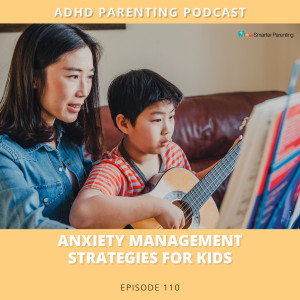
Wednesday Nov 18, 2020
Ep #110: Anxiety management strategies for kids
Wednesday Nov 18, 2020
Wednesday Nov 18, 2020
SUPPORT THIS PODCAST. JOIN THE SMARTER PARENTING CLUB SILVER TIER.
Children with ADHD often deal with other issues, including anxiety. The combination of both ADHD and anxiety can make it doubly hard for them to effectively handle situations where they're expected to behave a certain way.
Teaching them anxiety management strategies allows them to plan for and deal with situations in a way that reduces their anxiety. Anxiety management strategies don't have to be complicated. The most successful calming strategies are those that your child can do no matter the situation.
Some calm down strategies include breathing techniques, visualizing feelings, and physical grounding.
When teaching them calming techniques, it's essential to work with your child and model what you would like them to do. By modeling what they need to do, your child understands what is expected, removing confusion.
Using the ABC's of Behavior, you can find ways to address situations before, during, and after. The more you can help your child address situations early using anxiety management techniques, the more successfully your child can handle their anxiety.
You can find the ABC’s of Behavior on the Smarter Parenting website.
If you need additional help dealing with your ADHD child’s anxiety, sign up for parenting coaching. Both the gold and platinum tier of the Smarter Parenting club provides coaching.
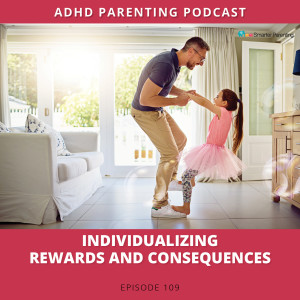
Wednesday Nov 11, 2020
Ep #109: Individualizing rewards and consequences
Wednesday Nov 11, 2020
Wednesday Nov 11, 2020
As parents, we want things to be fair when we give rewards or consequences. Fair does not mean the same, however, as no two children or situations are.
Individualizing rewards and consequences improves their effectiveness as it shows your child that you are interested in what they value. It also makes sure you're giving a reward or consequence that matters to your child. For example, one child may see not playing with friends as a consequence, where another might see that as a reward.
If the reward or consequence doesn't matter to your child, it will not help them learn.
The goal of rewards and consequences is to teach your child what you expect. They should never be used to punish your child. Punishing always goes to the extreme, which is less effective than starting small and adding consequences as needed.
When you focus on teaching your child, it helps your child move forward and know what to do next time. This knowledge increases their self-confidence and ability to make wise decisions.
Giving rewards and consequences that are different can be a struggle. By following the five components of Effective Positive Rewards or Effective Negative Consequences, you are better able to find individualized solutions that work for your child.
You can learn more about Effective Positive Rewards or Effective Negative Consequences at Smarter Parenting.
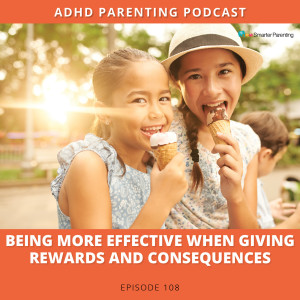
Wednesday Nov 04, 2020
Ep #108: Being more effective when giving consequences and rewards
Wednesday Nov 04, 2020
Wednesday Nov 04, 2020
Giving more effective consequences and rewards require parents to understand the difference between values and interests.
Values and interests are separate and serve different purposes, especially when helping change your child’s behavior using either Effective Negative Consequences or Effective Positive Rewards.
Values are what you believe and what you want your child to learn—things like confidence, hard work, honesty, kindness, and integrity. Interests are things that you like to do—such as playing sports, music, or travel.
Parents should use interest to help teach values when giving an Effective Negative Conseqeunces or an Effective Positive Rewards. For example, parents can use the interest of time with friends to teach the values of purpose, hard work, honesty, accountability, or responsibility. By combining both values and interests, you will be more successful.
Effective Negative Consequences and Effective Positive Rewards are two sides of the same coin and can both be used to change behavior. Which one to use will be determined by what you need to teach. For some situations, a consequence may be the best course of action for a particular behavior. For many children, though, Effective Positive Rewards are more effective in changing behavior than consequences. Many children may be more motivated to earn extra time if they come by curfew than by losing time if they’re late.
It’s essential to sit down and evaluate the values you want to teach your children, as this will give you a better game plan for using their interests to do so.
If you’re struggling with using interests to teach values, we recommend joining the gold or platinum level of the Smarter Parenting Club. Both of those levels allow for coaching and individualized help and solutions.
Please help us continue to provide this podcast. Donate or join the Silver level in the Smarter Parenting Club.
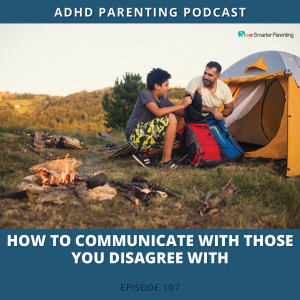
Wednesday Oct 28, 2020
Ep #107: How to communicate with those you disagree with
Wednesday Oct 28, 2020
Wednesday Oct 28, 2020
If there is one podcast we recommend listening to in the wake of what is going on globally, this is it.
We hope you will share it once you have listened to it.
Many have lost the ability to discuss topics they feel strongly about with someone who doesn't share their viewpoint without it turning ugly. Cancel culture, name-calling, fear of retribution, and lack of civility are alive and well.
This lack of civility is dangerous because it doesn't encourage growth or moving forward. Instead, we become even more passionate about what we believe.
We don't have to agree with someone, but we can learn to communicate openly and safely that fosters understanding. We must teach our children how to do this as we want a world where our children can express themselves and allow others to do the same.
Our view of the world is shaped by what we have experienced, and we view those experiences as sacred. When those beliefs are attacked, it can feel very personal, which creates an emotional response.
When someone believes something different from us and presents that viewpoint, it creates internal feelings of conflict as we don't like having what we believe challenged. This is called cognitive dissonance. Cognitive dissonance makes us feel uncomfortable when a different viewpoint is presented. There's inner turmoil to figure out where this person is coming from and why they believe what they believe, so often, it is easier not to wade into, but rather to become defensive and dismissive as we see it as a way to protect what we believe.
What parent doesn't want their child to feel comfortable coming to them and talking about sexuality and sex, what they believe (even if it's different than you), cause and movements, politics, and life-choices? If you haven't created a place where understanding can occur, these will not be productive conversations. Instead, these conversations could lead to a breakdown in relationships.
Effective Communication breaks down barriers and the emotional response we have, which allows us to get to a place where we can find solutions and understanding. Effective Communication will enable us to create a safe space to discuss difficult topics without it getting personal or argumentative.
Stephen R. Covey said, "Most people do not listen with the intent to understand; they listen with the intent to reply."
Effective Communication shows us how to listen and understand where the other person is coming from. Remember, you don't always have to agree with what they say. When you know where someone is coming from, you are more likely to find solutions and understanding.
Let’s use Effective Communication to create connections instead of division.
To learn more about Effective Communication, visit the Smarter Parenting website: https://www.smarterparenting.com/skills/effective-communication/

Tuesday Oct 27, 2020
Join the Smarter Parenting Club and help your family
Tuesday Oct 27, 2020
Tuesday Oct 27, 2020
The Smarter Parenting Club wants to help you take your parenting to the next level!
https://www.smarterparenting.com/coaching/
With three tiers, you will find the level of help your family needs.
The Silver Tier is our self-coaching where you will have access to recorded coaching sessions, the Smarter Parenting course, weekly Q&A sessions, as well as exclusive club content.
The Gold Tier gives you access to everything in the Silver Tier plus one coaching session a month with our Parenting Coach.
The Platinum Tier includes everything in the Silver Tier plus 3 coaching sessions a month with our Parenting Coach.
We can't wait to see you in the Smarter Parenting Club. Join today!
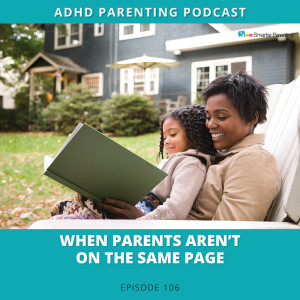
Wednesday Oct 21, 2020
Ep #106: When parents aren't on the same page
Wednesday Oct 21, 2020
Wednesday Oct 21, 2020
Not on the same page as your partner when it comes to parenting? You are not alone. How do we get on the same page is one of the most frequently asked parenting questions we receive.
No two parents’ parent the same. Because of life experiences, including how they were raised, it’s not uncommon for parents to have different parenting styles and priorities. The goal is to find ways to work through parenting differences and find solutions that both parents are happy with and implement.
If you and your partner can’t agree, it leads to inconsistent parenting practices. Inconsistent parenting practices are problematic for children as it sends mixed messages, and they are never entirely sure what they are supposed to do and who they should follow. For example, if you believe that your child must do chores, but your partner doesn’t, how does your child know what to do?
When dealing with conflict resolution, Harvard University’s course on conflict resolution recommends the following things: (https://www.pon.harvard.edu/daily/conflict-resolution/conflict-resolution-strategies/)
- Recognize we all have biases
- Overcome the "us vs. them" mindset
- Look beneath the surface to identify deeper issues
- Separate pseudo-sacred from sacred issues
When parents use these strategies, they can find solutions that work for both parties. Using these strategies in conjunction with Effecting Communication and Decision Making (SODAS Method) helps parents do just that.
Effective Communication allows you to feel heard and understood, while Decision Making helps you find solutions that work for both parties.
You can find the skills on the Smarter Parenting website: https://www.smarterparenting.com/
If you need specific help finding solutions for getting on the same page, join the Smarter Parenting Club. https://www.smarterparenting.com/coaching/
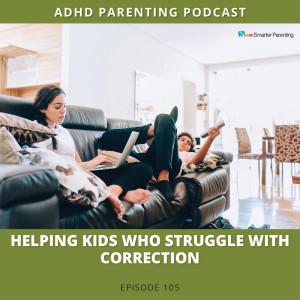
Wednesday Oct 14, 2020
Ep #105: Helping kids who struggle with correction
Wednesday Oct 14, 2020
Wednesday Oct 14, 2020
Most children don't like being corrected. For some children, that correction can be difficult and paralyzing. Children who struggle more than normal with being corrected may be suffering from Rejection Sensitivity Dysphoria.
Rejection Sensitivity Dysphoria means that they don't handle rejection well and get very upset if someone criticizes them, often to the point of focusing only on the criticism. For example, you could give a hundred positives about something they did well, but all they will remember is the one small criticism in a 100 positives.
Children with ADHD tend to be more prone to Rejection Sensitivity Dysphoria and can believe they are a problem instead of having a problem.
Rejection Sensitivity Dysphoria is real and can cause difficulties in relationships, school, and jobs. They tend to blame themselves, focus on the negative, or have trouble believing any praise given to them.
Correcting Behaviors' goal is to help them see that the correction doesn't mean they are a terrible person as the Teaching-Family Model skills are relationship-focused.
By being faithful to the steps, your child can see and understand that correction doesn't happen willy-nilly, but rather you are on their side to help them learn. It also helps them to realize that you are not here to punish them.
Correcting Behaviors can be incredible in helping your child deal with their Rejection Sensitivity Dysphoria.
If you're struggling with knowing how to correct your child best, sign up for coaching in the Smarter Parenting club and let us find tailored solutions for your family.
For full show notes visit: https://www.smarterparenting.com/adhd-parenting-podcast/
